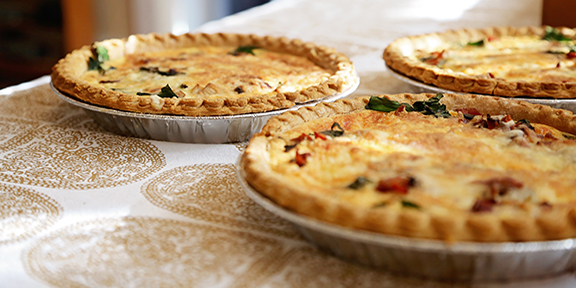When I moved to the country, life had much to teach me. Educated, young and thinking I knew damn near everything, I was introduced to a whole new way of seeing in my years in the wilderness. One of the new concepts I was introduced to was pie suppers.
Doy was a seventy-eight-year-old man who lived down the road and took us under his wing. Why, I will never know. Probably something between sympathy and entertainment value drove his nurturing and sheltering of our inexperienced souls.
One day Doy came by and said in his cryptic language “Come to the pie supper. At the church. Tomorrow. Bring a pie.”
“What’s a pie supper”? I shouted as he was leaving. Turning he replied “Tape your name to the bottom of the pie and a label with the kind of pie on top.” “What kind of pie?” “Peach. Apple. Blackberry’s good.” He was gone and I was clueless. A pie supper. Must be some kind of social experience.
I baked a blackberry pie and went to the church as instructed. Everyone for miles was there. Young and old. Locals and us transplants. This didn’t necessarily mean a lot of people—we lived in the one of the least populated counties in the nation—but the small country church was filled. Pies were lined up on tables set up at the front near the pulpit, looking like they were waiting for Judgment Day. I added mine to the grouping and looked for Doy, our great cultural sage.
I snagged him in the graveyard and asked for guidance. He knew I had grown up in a city and was therefore relatively ignorant and needed patience and understanding. He explained that Charlie’s daughter was sick and needed a pie supper (as if this crystallized everything). I’m sure the look on my face expressed new depths of ignorance. I couldn’t figure out why a sick child needed to eat pies.
Taking yet another deep breath, he said, “The pies aren’t for the child. The pie supper’s to raise money for the medical bills. The pies are auctioned to raise money.” With this explanation I also received the most condescending look I’ve ever seen in my life, quickly followed by a good natured chuckle. His eyes seemed to ask, “How could you be raised so ignorant? What did you do in the city?”
Calls came from the church door to gather inside. I took my place on the pew between Doy and the sheriff’s wife. The preacher stood and said a few words about the fickleness of life and turned the pulpit over to an auctioneer-neighbor. He stood and chose a prized pie. A strawberry rhubarb is always picked first explained Doy. “I could have baked a strawberry rhubarb,” I told my cultural sage. “It’s not your place,” he admonished.
The bidding started at twenty-fine dollars. I looked around the room at a collection of folks that I at least knew by sight if not by name, some of the finest people I’ve ever known but poor as could be. I knew no one in this room had even twenty dollars to spare. What was he thinking? Twenty-five dollars for a pie!
Two hands went up, then another. Thirty-five. Forty. Forty-five. Hands were still flying up. Over the next hour I saw people who had no money pay fifty and seventy-five dollars for a pie. I saw people give until it hurt to do so. I watched a humbled Charlie as he nodded to each bidder.
An elbow poked me in the side. “Buy a pie,” the sage said. I entered the bidding and to my dismay purchased a vinegar pie. What’s a vinegar pie?
The pie auction came to a close and I was instructed to eat a piece of the pie with the baker whose name was taped to the bottom. I found my baker, a ninety-year-old woman who had lived on the next mountain all her life. As we sat eating vinegar pie together (I would eat a second piece of pie later with the one who bought my pie), she keenly observed that I wasn’t from ’round here.
She explained how Charlie’s young daughter was playing in some old hay and inhaled mold spores that took up residence in her moist lungs and were giving the youngster a devil of a time. She’d been hospitalized for two weeks now. It was looking grim.
I left that day with a new understanding of community. No one had insurance of any kind. Health-Property-Life was a state of existence and not a policy. Your neighbors were the closest thing to insurance you’d ever have. The pies were premiums. If your barn burned down or your medical bills threatened to overwhelm you, your neighbors would host a pie supper for you. They would give when they didn’t have it to give. They took care of their own, which included us outsiders.
We all needed each other in a way that the city never taught me about. All the independence and self-reliance I had learned from both family and society served me well but left me cold. That first pie I bought for fifty dollars was my induction to a community bound together for not only our well-being but our survival. In the years that followed I bought many pies and fortunately never needed a pie supper myself.
I know it’s idealistic, but I think any community could be closer with an occasional pie supper. We wave from our air-conditioned cars and peer from our closed windows at neighbors whose names we often don’t know. We don’t need each other. We come and go and prosper—or not—in independence. We hide our struggles and reach inward rather than outward for solace. A good pie supper would help.
Charlie’s daughter died at the too-young age of eight from pneumonia due to the growth of mold spores in her lungs. We mourned her together. The innocence of play in a pile of hay led to her premature demise. All the pie suppers in the world couldn’t put Charlie together again but they did pay the medical bills.
The vinegar pie was…interesting but excellent—like dumplings in a sweet-tart sauce. For me, it echoed life.
Originally published in The Good Life magazine

